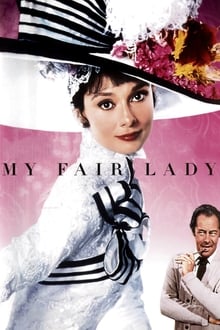
A film with a lot of quality, but also with some mistakes that are difficult to forgive.
This is one of those films that I heard a lot about before I actually decided to sit down and watch it. It is considered by many to be one of the greatest musicals of all time, and I can agree that it is really very good and deserves this award. However, it was not entirely to my liking, as I will have the chance to explain.
Heavily inspired by the classic story of Pygmalion, the script takes us to the early years of the 20th century to meet a boastful linguist called Prof. Henry Higgins. He is an expert in languages and diction, and is fully convinced that the majority of British people do not know how to speak their language correctly (my question is whether there are, in any country, that many people who value their mother tongue). And to prove the usefulness of this domain, he decides to take a very simple and popular woman, the flower seller Eliza, into his own home and train her like a dog. When it's all over, he effectively achieved a big change in that girl, both in terms of speech and behavior, as well as in terms of mentality and life expectations.
This leads me to talk about what bothers me most: the way that annoying and presumptuous character decides to use another person for his purposes without thinking about that. Higgins is a selfish and egoic man, as well as being clearly misogynistic and thinking he has the power to mold people to his liking. In addition, the script confuses different things: knowing how to speak well and knowing how to behave in society. I can know how to speak my language in the most perfect way and not know the rules I should follow at a social ball or gala dinner. They are different things. The issue is addressed in the Ascott scenes, but we are left without knowing how Eliza learned to behave from then on.
On a technical level, the film is incredible. It seeks to adapt a Broadway musical, but it also draws a lot of inspiration from an older film, from the 30s. Thus, it has excellent melodies and songs, the same as the original musical. Unfortunately, the actors barely sing a syllable: they were sung by professionals off-stage, in a bad decision by the producers that greatly upset Audrey Hepburn herself. Another flaw is the confusion in the period conception: the film takes place in 1911 or 1912, but there is a wide range of later props and a moment in which the English king is not the one who actually reigned at the time. The film largely compensates for these flaws with excellent cinematography, very well framed and bright, full of vibrant and intense colors (note: I saw the restored version of the film), and with incredible costumes, particularly those made for Hepburn, and which still have a place today in private collections and museums: I think one of her costumes was auctioned off for a fortune a few years ago.
The cast has several important actors. Audrey Hepburn brilliantly assumes the role of Eliza, which had previously been played by Julie Andrews on Broadway, and takes advantage of this opportunity to clearly demonstrate her talent. However, I feel that the film doesn't take full advantage of the actress' potential and doesn't give her the space to give her all. Thus restrained, Hepburn does what she can, but fans will be able to see her in much better shape in other films. The one who dominates the scene the most is Rex Harrison: the actor exudes talent and seems perfectly suited for the character that, in fact, he had played on Broadway for a few years. We cannot forget the contributions of Stanley Holloway and Jeremy Brett, who do a very good job on underutilized characters.